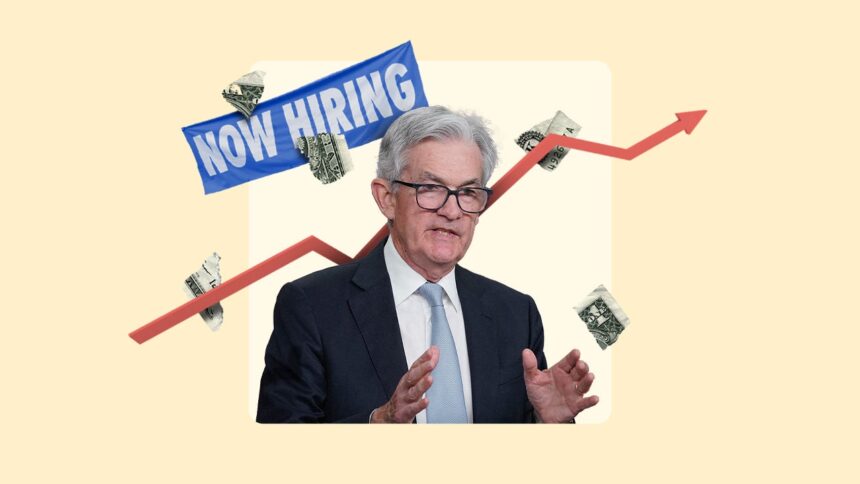To the surface viewer, the Federal Reserve seems prefer it’s come near reaching the inconceivable gentle touchdown of the U.S. financial system. Rates of interest are the best in additional than 20 years and inflation is sort of a 3rd of what it was once, but unemployment stays traditionally low and a recession is nowhere to be discovered.
The nation’s prime economists, nevertheless, say the U.S. central financial institution may not wish to get too snug simply but.
A extreme recession doesn’t seem like it’s across the nook, however a slowdown might be, in accordance with forecasts from Bankrate’s Second-Quarter Financial Indicator Survey. Unemployment is anticipated to hit an nearly three-year excessive, and over the following 12 months, employers are projected to create about half as many roles. Driving the moderating financial atmosphere is a Fed decided to maintain rates of interest excessive. The Fed is anticipated to start modestly slicing rates of interest in September as inflation takes via the top of 2025 — or longer — to return to its official 2 p.c goalpost, economists say.
Indicators are already pointing to a deceleration from a fast post-pandemic growth — albeit not in a means that’s elevating any alarm bells simply but. For the primary time since November 2021, joblessness is now at 4.1 p.c, nonetheless traditionally low however up from 3.4 p.c final 12 months. The variety of job openings per each unemployed employee is again to ranges final seen earlier than the outbreak. Wages, in the meantime, are nonetheless rising quicker than they have been earlier than the pandemic, however companies are not providing the large pay bumps unique to the early months of the financial system’s reopening.
The financial system’s full-year story is but to be written. The excellent news is that the U.S. financial system has continued to keep away from a recession. The headwinds of elevated costs and excessive rates of interest, nevertheless, are being felt, with the unemployment charge edging up from a multi-decade low.
— Mark Hamrick, Bankrate Senior Financial Analyst
Bankrate has been polling the nation’s prime economists on their expectations for the job market, inflation, the Federal Reserve, financial development and extra on a quarterly foundation for nearly a decade. Learn on for the most recent findings.
Key insights on the financial system from Bankrate’s Q2 2024 Financial Indicator ballot
Unemployment seen hitting a close to three-year excessive by June 2025
The U.S. jobs market isn’t any underdog. For 2 consecutive years, employers have added essentially the most jobs in a 12-month interval since 1999, whereas the unemployment charge held under 4 p.c for the longest stretch of time because the Sixties.
Hiring has additionally dodged the slowdown most economists have been anticipating. Again in March 2023, the nation’s prime economists thought the unemployment charge would hit 4.6 p.c by March 2024 and employers could be slicing jobs. As a substitute, unemployment solely rose to three.8 p.c, and on common, employers added 242,000 jobs every month over the 12-month interval. Economists have been adjusting accordingly, every quarter anticipating a slowdown that isn’t as fierce because the one they have been anticipating within the prior-polling interval.
But, the message stays clear: Economists are nonetheless anticipating the job market to decelerate. By June 2025, the unemployment charge is anticipated to hit 4.3 p.c, and employers are anticipated to create 115,000 jobs every month, on common, over the following 12 months, down from the earlier 12-month tempo of 218,000, in accordance with economists’ common forecast.
Each economist expects unemployment to be larger than it’s now and hiring to sluggish from its present tempo. Responses ranged from a low of 4.1 p.c to as excessive as 5 p.c for the unemployment charge. The worst forecast penciled in job cuts of 25,000 every month, on common, over the following 12 months, whereas essentially the most upbeat estimate expects job development to common 180,000 a month. On the identical time, most economists (94 p.c) anticipate that the U.S. financial system will nonetheless proceed so as to add jobs over the following 12 months.
What the nation’s prime economists are saying in regards to the job market
U.S. job development is anticipated to stay in a decrease gear over the following 12 months as restrictive financial coverage continues to place downward strain on client and enterprise spending.
— Scott Anderson, Chief Economist at BMO Capital Markets
So long as even a reasonable growth continues, and we let in international staff at latest charges, the labor market ought to proceed its growth for the following 12 months.
— Robert Frick, Company Economist on the Navy Federal Credit score Union
Inflation may keep sizzling via 2025 — or longer
Costs aren’t rising as shortly as they as soon as have been, with inflation most not too long ago hitting 3.3 p.c in Could after rising as quick as 9.1 p.c in June 2022. Nonetheless, cooling inflation has been caught close to 3 p.c for the previous 12 months, flatlining amid a pop in unstable power costs. Economists are additionally nonetheless ready for stickier housing and companies inflation to sluggish.
Inflation may keep caught for some time longer, the nation’s prime economists say. Most are caught between considering inflation will hit the Fed’s desired 2 p.c degree by the top of 2025 (41 p.c) or by the top of 2025 or later (41 p.c). A smaller share (12 p.c) say costs may hit 2 p.c by the top of 2024, whereas 6 p.c stated “different/don’t know.”
Economists aren’t as upbeat about inflation as they have been within the prior-quarter interval. In polling from final March, the most important share of specialists (35 p.c) stated inflation may attain the Fed’s 2 p.c goalpost by the top of 2024, even when these odds solely barely trailed the share of economists who anticipated 2 p.c inflation by the top of 2025 (29 p.c) or the top of 2026 (29 p.c).
Even so, economists are significantly extra hopeful than they have been originally of 2024, when most specialists (60 p.c) thought inflation wouldn’t hit 2 p.c till the top of 2025. The latest optimism might be as a result of costs slowed greater than anticipated in Could, after topping expectations for 3 straight months initially of the 12 months.
What the nation’s prime economists are saying about inflation
Extra disinflation is within the pipeline, as decrease items and power costs, mixed with cooling housing prices that present up within the inflation indices with a lag, will assist deliver general inflation nearer to the Fed’s 2 p.c goal by the top of 2024.
— Yelena Maleyev, Senior Economist at KPMG
Housing disinflation ought to present up within the third quarter, considerably impacting the topline inflation quantity. That stated, it’s going to take extra time for inflation to get again to 2 p.c as a result of structural modifications of the financial system within the post-pandemic period.
— Tuan Nguyen, Economist at RSM
Fed most certainly to chop rates of interest at September assembly
Even with some not-so-good information on inflation initially of the 12 months, most economists (88 p.c) nonetheless anticipate that the Fed will minimize rates of interest in some unspecified time in the future in 2024. About half (53 p.c) say the Fed will minimize rates of interest at its September assembly, 12 p.c say the Fed will minimize rates of interest in November and 24 p.c say the primary charge minimize may occur in December.
The Fed, nevertheless, doubtless gained’t minimize borrowing prices as a lot as they initially thought they might this 12 months. A part of that’s due to the calendar. Fed officers, who as soon as penciled in three charge cuts for 2024, have 4 conferences left this 12 months. One more reason is policymakers would favor to not minimize rates of interest at back-to-back conferences. It might exacerbate inflation, however economists admit it’d seem like they’re in a rush and nervous in regards to the financial system, too.
Even so, the message stays clear. Whether or not the Fed cuts rates of interest a couple of times in 2024 will largely be inconsequential to customers hard-hit by traditionally excessive borrowing prices and benefited by sizzling financial savings yields. The Fed raised rates of interest 11 instances by a whopping 5.25 share factors, the quickest tempo because the Nineteen Eighties because it rushed to sluggish the financial system and defeat boiling inflation.
“The timing of the Federal Reserve’s first rate of interest minimize stays in query, suggesting charges will certainly stay considerably larger for considerably longer,” Hamrick says. “On the opposite facet of the rate of interest coin, the chance to profit from larger yields for savers can also be persisting.”
What the nation’s prime economists are saying about rate of interest cuts
The subsequent charge minimize is prone to happen in both September or December, although the Fed’s official forecasts from the June FOMC now present {that a} slight majority of policymakers see December as the higher selection.
— Mike Englund, Chief Economist at Motion Economics
We proceed to consider a July onset of the easing cycle would have been optimum given easing inflation and softening labor market circumstances, however a September onset is now extra doubtless given policymakers’ backward-looking hawkish bias.
— Gregory Daco, Chief Economist at EY
The Fed has forcefully communicated the necessity to see a definitive slowdown in inflation, regardless that it might include lagging housing shelter knowledge, and due to this fact, to keep up its verbal credibility, it’s going to maintain again on a charge minimize.
— Lawrence Yun, Chief Economist, Nationwide Affiliation of Realtors
US financial system has a 33% likelihood of being in a recession by this time subsequent 12 months
Most economists appear to point that the long-feared recession spurred by larger rates of interest doubtless isn’t across the nook, even because the job market is anticipated to chill. Economists say the chances of a recession inside the subsequent 12 months are barely lower than 1-in-3 (32 p.c), hitting the bottom degree since Bankrate first began polling economists on their recession odds. Final quarter, these odds had fallen from 45 p.c to a two-year low of 33 p.c because the U.S. financial system continued to face its floor in opposition to larger rates of interest.
The bottom odds amongst any economist hit 10 p.c, on the grounds that forward-looking indicators of the financial system are nonetheless pointing to development forward. But, one economist penciled in one hundred pc odds, noting issues about federal money owed and spending.
What the nation’s prime economists are saying in regards to the possibilities of a US recession
Recession fears are overdone and untimely. The financial knowledge has typically are available in weaker than anticipated, however this isn’t the primary time, nor will or not it’s the final, that this happens with out the financial system falling right into a recession. Not all financial knowledge surprises are equal and the exhausting knowledge, which issues, has held up.
— Ryan Candy, Chief Economist at Oxford Economics
The danger of a recession occurring via the following 12 months has fallen precipitously since early 2023. The financial system has proved resilient to the present excessive rate of interest atmosphere, and with charges prone to begin coming in by the top of the 12 months, some extra weight will probably be eliminated.
— Dante DeAntonio, Senior Director of Financial Analysis at Moody’s Analytics
I’ve been sluggish to let go of the forecast of a gentle recession in coming quarters. At this level, I can not deny the resilience of the U.S. financial system, aided by the infusion of federal spending on infrastructure, chip manufacturing, and different such packages. On the identical time, I consider that prime rates of interest are nonetheless performing as a drag on financial exercise.
— Bernard Markstein, President and Chief Economist at Markstein Advisors
Mortgage charges to remain at decade-plus excessive by finish of 12 months
The 30-year fixed-rate mortgage was by no means anticipated to fall again to the extent it held within the years because the 2008 monetary disaster — not to mention the lows of the pandemic period. However one consequence of upper rates of interest for even longer is that the important thing residence financing charge is certain to shut out the 12 months even larger than initially anticipated, too.
The 30-year fixed-rate mortgage is anticipated to hit 6.6 p.c by the top of the 12 months, in accordance with the common forecast amongst economists in Bankrate’s ballot. All through all of 2025, in the meantime, it’s projected to common a barely decrease 6.14 p.c.
If it involves fruition, that might be larger than most specialists anticipated earlier this 12 months. Bankrate’s annual rate of interest forecast for 2024, for instance, penciled in a 5.75 p.c mortgage charge by the top of the 12 months.
The Fed doesn’t affect mortgage charges as instantly as bank card charges or deposit yields, however each borrowing prices are likely to comply with the identical tendencies. Working example: The benchmark for the 30-year fastened charge — the 10-year Treasury yield — has been holding among the many highest ranges in over a decade, as inflation stays sizzling, development stays resilient and rates of interest keep excessive. That key charge is anticipated to hit 3.96 p.c by June 2025, in accordance with the common forecast among the many nation’s prime economists.
Mortgage charges have been stubbornly caught above 7 p.c since February, they usually’ve been above 6 p.c because the fall of 2022 after not beforehand reaching ranges that prime since 2008, in accordance with Bankrate’s historic mortgage charge knowledge.
What the nation’s prime economists are saying about mortgage charges
Whereas the Federal Reserve doesn’t instantly influence mortgage charges, longer-term charges together with mortgage charges do worth within the anticipated path of future Fed charge strikes. As soon as the Fed kicks off a charge slicing cycle, we do anticipate that mortgage charges will transfer considerably decrease. Nevertheless, we anticipate that this slicing cycle will probably be comparatively transient, and if markets agree with that expectation, long-term charges is not going to drop that far.
— Mike Fratantoni, Chief Economist on the Mortgage Bankers Affiliation
Persistent inflation and the Fed’s dedication to sustaining larger charges for an prolonged interval are anticipated to maintain mortgage charges elevated and inside a slender vary within the close to time period.
— Odeta Kushi, Deputy Chief Economist at First American Monetary Company











